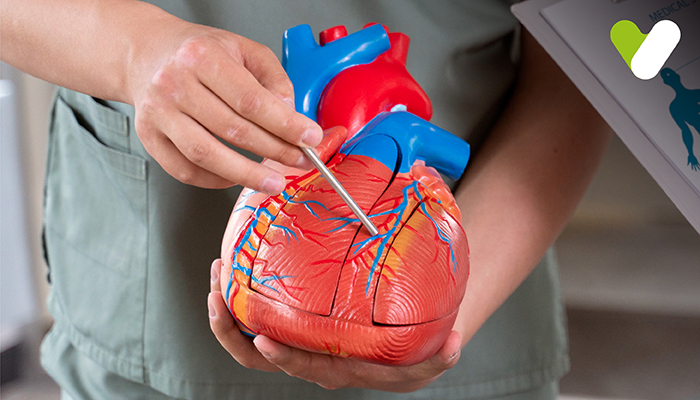Heart blockage is a term referring to as coronary artery disease that is commonly used by patients, a build-up of plaque-causing narrowing of the arteries that provide the heart muscle with blood. Heart blockage can allow the muscle from getting the blood it needs to function if severe enough, especially when more blood movement is required. This occurs symptoms such as chest pain and shortness of breath.
The plaque could also break off and cause a heart attack or sudden cardiac death.
Impacts of a complete heart blockage
Heart blockages are not equally created. Treatment of an artery that is 97% blocked is easier than treating one that has been 100% blocked for a long time. The symptoms are- chest pain, tightness, and shortness of breath.Sometimes, when arteries are fully blocked, a new blood supply is produced around the blockage. This new blood supply is known as collaterals, not delivering much blood to your heart. This can prevent those same symptoms of chest pain and shortness of breath.
A stress test can help identify if you have these symptoms if a blockage in an artery causes something else.
Where are the coronary arteries? What do they do?
Coronary arteries are the blood vessels that provide rich oxygen blood to your heart muscle to keep it pushing. The coronary arteries stay on top of your heart muscle. You have four main coronary arteries:- The right coronary artery.
- The left coronary artery.
- The left anterior descending artery.
- The left circumflex artery.
Heart Blockage Symptoms
The most common symptom of heart blockage is angina or chest pain.People describe angina as:
- Aching
- Burning
- Fullness
- Heaviness
- Numbness
- Pressure
- Squeezing
- Weakness or dizziness
- Arms
- Back
- Jaw
- Neck
- Shoulder
- Faster heartbeat
- Nausea
- Palpitations (irregular heartbeats, skipped beats)
- Shortness of breath
- Sweating
- Weakness
Heart Blockage Treatment
Here is the treatment for heart blockage that involves:- Lifestyle changes: Quit smoking. Eat less processed food that changes to a diet low in t fats, salt, and sugar. If you have diabetes, maintain your blood sugar level in control. Do exercise regularly but ask your doctor before starting an exercise program.
- Medications: You might need medication if lifestyle changes aren’t enough for you. The drugs you take depend on your situation. You should take if you’ve been diagnosed with coronary artery disease:
- Aspirin
- Medications that help cholesterol (statins, niacin, fibrates, and bile acid sequestrants)
- Beta-blockers
- Calcium channel blockers
- Ranolazine
- Nitroglycerin
- ACE inhibitors
- Angiotensin II receptor blockers (ARBs)
- Evolocumab (Repatha), which reduce the risk of heart attack and
- Colchicine - 0.5 mg (or 0.6 mg) daily for those receiving other secondary preventive strategies
- Balloon angioplasty
- Coronary artery bypass surgery
- Stent placement
- Angiogenesis. You take stem cells and other genetic material for this treatment through your vein or directly damage your heart tissue. It allows new blood vessels to go around the clogged ones.
- Enhanced external counterpulsation (EECP). People who have long-term angina but do not get help from nitrate medications or don’t take some procedures may find relief with this. It’s an outpatient procedure where you won’t require to be admitted to the hospital that cuffs are used on the legs that inflate and deflate to increase blood supply to your coronary arteries.
- Stop smoking.
- Maintain your blood pressure
- Eat healthy foods that are good for your heart.
- Avoid alcohol.
- Exercise.
- Maintain a healthy weight.
- Control your stress.
Heart Blockage Risk Factors
Mentioned below are the risk factors for heart blockage disease. They include:- Age older than 65
- Overweight or obese
- Diabetes
- Family history
- Gender- Men have a higher chance of heart attack and have them earlier, as compared with women until the risk happens at age 70.
- High blood pressure
- High cholesterol
- High stress
- Lack of physical activity
- Smoking or breathing
- Unhealthy diet
What are the complications of heart blockage?
Coronary artery disease can prevent the following other heart conditions:- Angina.
- Heart attack.
- Heart rhythm problems.
- Heart failure.
- Cardiogenic shock.
- Sudden cardiac arrest.
Preventing heart blockage
You can decrease your risk of getting coronary heart disease by making some simple lifestyle changes.These include:
- Eating a healthy food
- Maintain balanced diet
- Being physically active
- Quit smoking
- Maintain blood cholesterol and sugar levels
Conclusion
Heart Blockage is a thick or blocked coronary artery usually caused by the buildup of fatty material called plaque. It can cause angina and heart attack. At regular intervals, you can see your management plan can be changed if you know the risk factors and symptoms for the disease.Talk with your healthcare provider to make lifestyle changes in your lifestyle that will help in your life.


